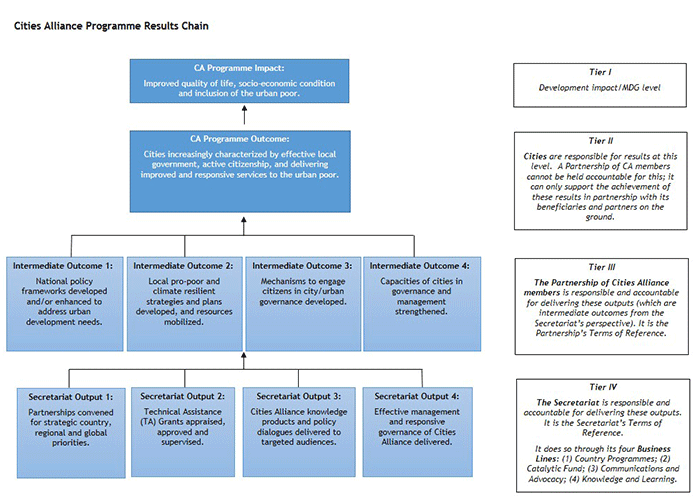[17 February 2014] -- The Cities Alliance has sought to improve the quality of urban development since its establishment in 1999. Over the years, we have had many successful projects and gained a solid reputation in the field.
On a wider scale, our objectives have been closely linked with the formulation of global development frameworks. The Cities Without Slums Action Plan drew global attention to the importance of slum upgrading when its targets were incorporated into the UN Millennium Development Goals (Target 11).
But how well are we actually achieving our core goal: enabling cities to be more effective, participatory and able to deliver improved, responsive services to the urban poor?
In an effort to answer that question, the Cities Alliance has developed a new performance monitoring system to measure the results of its activities and capture their impact in a systematic way.
At the heart of the new system is a Results Framework, which allows the Cities Alliance to measure its internal efficiency and clearly show members and donors the value of their investment in the partnership. It also includes performance indicators to help measure and document progress across the various tiers of results, with baselines, milestones and targets.
In addition to benefitting the Cities Alliance, the intention is that the Results Framework will better position the partnership to contribute to the Post 2015 sustainable development agenda – just as the Cities Without Slums Action Plan did with the MDGs.
The framework was formally approved and endorsed by the Cities Alliance Consultative Group at its November 2013 meeting in Ouagadougou, Burkina Faso.
A framework for results, accountability
The new Results Framework is the culmination of a transformation process for the Cities Alliance that included a new Charter in 2010, a new business model in 2011, and the development of a Theory of Change to help the Cities Alliance determine how best to use its resources to achieve its medium- and long-term development goals.
It is designed to serve as the basis for strategic planning cycles and enable the partnership to prioritise activities. With its emphasis on accountability, performance and results, the framework also shows the Cities Alliance’s commitment to a strong reporting system for our partners and governing boards.
The Results Framework further defines the Theory of Change and lays out the different levels of results expected by the partnership, so that all parties – Cities Alliance Secretariat, its members, and cities – can be held accountable. The Results Chain shows how each step builds towards achieving cities with improved quality of life and better opportunities for all, especially the urban poor.
It lays out the products and services that the Cities Alliance Secretariat will deliver (the Outputs); their effect on our client, or Cities Alliance member (the Intermediate Outcome); the effect on cities (Outcome); and, finally, the overall development impact at the global level. Across these four tiers, the framework includes 47 SMART indicators with definitions and data sources.

Communicating our results
he Cities Alliance Secretariat has already begun operationalising the results framework. This has involved collecting baseline data, setting preliminary targets and performance standards for each of the indicators, revising relevant monitoring and evaluation tools, and developing a detailed implementation plan.
The implementation process will benefit and build on the Cities Alliance project database, which houses detailed information on Cities Alliance operations since 2007. The project database will also be used to collect and elaborate future M&E information and reports. Now that the Cities Alliance is part of UNOPS, all of this data will be made publicly available in compliance with the International Aid Transparency Initiative (IATI).
The data collected through this process will form the basis for the Cities Alliance’s first-ever corporate scorecard, which will provide a snapshot of the partnership’s overall performance. The scorecard will be a valuable tool that will help us continuously monitor our performance and foster strategic dialogue among our members and governing board.
In addition to the scorecard, the Cities Alliance’s progress towards achieving its goals will be outlined in a results-based Annual Report. For more details about the Cities Alliance’s new performance monitoring system and specific indicators that will be used, please see “Performance Indicators and Monitoring System for the Cities Alliance: A Results-based Approach.”

The new results framework helps the Cities Alliance evaluate how well it is achieving its goal of inclusive cities with better services for the poor. Photo: Cities Alliance
“This is a major milestone for the Cities Alliance. The partnership now has a solid framework for measuring and communicating its results, which will help it contribute to the global debate as the post-2015 development agenda is being formulated.” -- Federico Silva, Cities Alliance Senior Programme Specialist
Related Information




